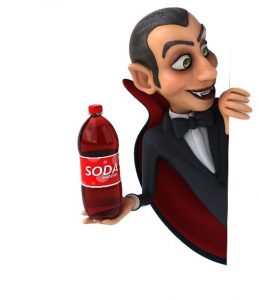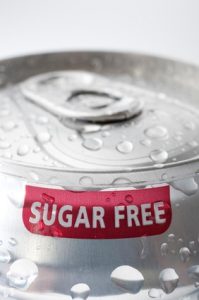Are Diet Sodas Just As Bad As Regular Sodas?
Author: Dr. Stephen Chaney
Americans love our sodas.
- 48% of Americans drink 2 or more sodas every day. Even worse:
- 61% of children and 56% of young adults consume 2 or more sodas every day.
- The average consumption for soda drinkers is 21 ounces a day.
 However, the word is out that regular (sugar sweetened) sodas increase our risk of obesity, diabetes, and heart disease, so many people are switching to diet (artificially sweetened) sodas. In a recent survey looking at diet versus regular soda consumption:
However, the word is out that regular (sugar sweetened) sodas increase our risk of obesity, diabetes, and heart disease, so many people are switching to diet (artificially sweetened) sodas. In a recent survey looking at diet versus regular soda consumption:
- 43% of adults chose diet sodas rather than regular sodas.
When this was broken down by gender:
- 46% of women and 39% of men preferred diet sodas.
When this was broken down by demographics:
- Older adults, people who aren’t white, and people making less than $30,000/year were the groups most likely to choose diet sodas.
However, recent studies have called into question our assumptions about the benefits of diet sodas. These studies suggest that people consuming diet sodas are just as likely to become obese and to develop diabetes and heart disease as those consuming regular sodas. Some studies have even suggested that diet sodas, but not regular sodas, increase our risk of stroke. I have discussed the evidence for these concerns about diet sodas in a recent issue of Health Tips From the Professor.
However, the latest study (A Mullee et al, JAMA Internal Medicine. Doi: 10.1001/jamainternalmed.2019.2478 ) ups the ante. It suggests that sodas increase our risk of dying and that diet sodas may be worse for us than regular sodas.
How Was The Study Done?
 This study utilized data from the European Prospective Investigation into Cancer and Nutrition (EPIC). In particular, this study enrolled 451,743 adults (average age = 51) from 10 countries in Europe and followed them for between 16 and 19 years. In short, this was a very large study, and it followed study participants for a long time.
This study utilized data from the European Prospective Investigation into Cancer and Nutrition (EPIC). In particular, this study enrolled 451,743 adults (average age = 51) from 10 countries in Europe and followed them for between 16 and 19 years. In short, this was a very large study, and it followed study participants for a long time.
Participants were excluded from the study if they had been diagnosed with cancer, heart disease, stoke, or diabetes prior to the beginning of the study.
At the beginning of the study the participants filled out a diet survey which asked, among other things, how many 8-oz glasses of regular sodas and/or diet sodas they consumed per month, week, or day.
Mortality data were obtained from each country’s health records. During the study, 41,963 deaths were recorded.
Do Sodas Increase Your Risk Of Dying?
 The results of the study were striking. When they looked at the number of deaths that occurred during the study, and compared people who consumed ≥ 2 glasses/day to those who consumed ˂ 1 glass/month, death from any cause was increased by:
The results of the study were striking. When they looked at the number of deaths that occurred during the study, and compared people who consumed ≥ 2 glasses/day to those who consumed ˂ 1 glass/month, death from any cause was increased by:
- 17% for all sodas.
- 8% for regular sodas.
- 26% for diet sodas.
Both total soda consumption and diet soda consumption increased the risk of death due to circulatory diseases (atherosclerosis, heart attack, congestive heart failure, and stroke). When they compared people who consumed ≥ 1 glass/day to those consuming ˂ 1 glass per month, the increase was:
- 27% for total soda consumption
- 52% for diet soda consumption.
Both total soda consumption and regular soda consumption increased the risk of death due to digestive diseases (diverticulitis, liver disease, and colon cancer). When they compared people who consumed ≥ 1 glass per day to those consuming ˂ 1 glass per month, the increase was:
- 50% for total soda consumption.
- 59% for regular soda consumption.
Total soda consumption (≥ 1 glass per day compared to ˂ 1 glass per month) also increased the risk of:
- Colon cancer by 25%.
- Parkinson disease by 59%.
The results were essentially the same for men and women.
The authors concluded: “This study found that consumption of total, sugar-sweetened, and artificially sweetened soft drinks was positively associated with all-cause deaths in this large European cohort; the results are supportive of public health campaigns aimed at limiting the consumption of soft drinks.”
What Are The Strengths and Weaknesses Of This Study?
 The strengths of this study are its size (451,743 participants, 41,693 deaths) and duration (16-19 years). The size allows for conclusions that are highly statistically significant. The duration allows enough time for diseases to develop and deaths to occur.
The strengths of this study are its size (451,743 participants, 41,693 deaths) and duration (16-19 years). The size allows for conclusions that are highly statistically significant. The duration allows enough time for diseases to develop and deaths to occur.
The weakness of this study is that it is an association study. Association studies do not prove cause and effect. There is always a chance that the association is caused by some other variable that was not measured.
For example, in this study when high consumers of sodas (≥ 2 glasses/day) were compared to low consumers of sodas (˂ 1 glass/month), they were more likely to be:
- Younger.
- Current smokers.
- Physically active.
- Overweight.
You may have noticed that two of these variables (age and physical activity) decrease the risk of death while the other two (smoking and weight) increase the risk of death. However, the authors did not just assume they cancelled each other out. They statistically corrected for these variables and many others in coming to their conclusions.
Of these variables, weight is the most concerning. We know from previous studies that soda consumption is likely to lead to obesity, and obesity increases the risk of death. However, the authors of this study not only statistically corrected for obesity. They also looked at the effect of high soda consumption on death in a subgroup of participants who were at a healthy weight (BMI ˂ 25). The increased risk of death was:
- 18% for all sodas.
- 11% for regular sodas.
- 27% for diet sodas.
In other words, the effect of sodas on the risk of death was virtually identical for those who were at ideal weight and those who were overweight. This finding significantly strengthens the conclusion of the study.
Finally, the conclusions of this study are strengthened by two recent, very large studies in the US that have come to similar conclusions.
All of these are association studies. However, nobody is going to do a 15-20 year randomized, placebo-controlled study in which regular and diet soda consumption are compared to water. These association studies are the best evidence we are likely to get.
Are Diet Sodas Just As Bad As Regular Sodas?
 The handwriting about regular sodas has been on the wall for some time. The soda industry is still claiming that “soft drinks are safe to consume as part of a balanced diet,” but virtually all medical and public health organizations recommend that we decrease soda consumption.
The handwriting about regular sodas has been on the wall for some time. The soda industry is still claiming that “soft drinks are safe to consume as part of a balanced diet,” but virtually all medical and public health organizations recommend that we decrease soda consumption.
But what do we replace those sodas with? Many public health organizations believe that the American public is so wedded to our sodas that diet sodas are the only viable alternative. But the evidence that diet sodas are not a good alternative to regular sodas continues to mount.
As I said in the introduction, recent studies suggest that people consuming diet sodas are just as likely to become obese and to develop diabetes and heart disease as those consuming regular sodas. Some studies have even suggested that diet sodas, but not regular sodas, increase our risk of stroke. I have discussed the evidence for these concerns about diet sodas in a recent issue of Health Tips From the Professor.
Even worse, this study and two other recent studies suggest that diet sodas are just as likely to increase the risk of premature death as regular sodas. The evidence is starting to become overwhelming that diet sodas are just as bad for us as regular sodas, and we should start turning to healthier alternatives.
Pure water is, of course, the best alternative. However, if plain water is too boring, try herbal teas. If you crave the fizz of sodas, try unsweetened sparkling water, perhaps infused with a little of your favorite fresh fruit. If you crave the caffeine of sodas, coffee or tea might suit you best, preferably without the sugar and cream. There are just two caveats:
- Tea and coffee should not be your only source of liquid.
- It goes without saying that you want to avoid the 500 calorie Starbucks extravaganzas.
The Bottom Line
A recent study followed 451,743 adults for 16-19 years and asked what effect soda consumption had on their risk of dying. The results of the study were striking. When they looked at the number of deaths that occurred during the study, and compared people who consumed ≥ 2 glasses/day to those who consumed ˂ 1 glass/month, death from any cause was increased by:
- 17% for all sodas.
- 8% for regular sodas.
- 26% for diet sodas.
Both total soda consumption and diet soda consumption increased the risk of death due to circulatory diseases (atherosclerosis, heart attack, congestive heart failure, and stroke). When they compared people who consumed ≥ 1 glass/day to those consuming ˂ 1 glass per month, the increase was:
- 27% for total soda consumption
- 52% for diet soda consumption.
The authors of the study concluded: “This study found that consumption of total, sugar-sweetened, and artificially sweetened soft drinks was positively associated with all-cause deaths in this large European cohort; the results are supportive of public health campaigns aimed at limiting the consumption of soft drinks.”
The evidence is starting to become overwhelming that diet sodas are just as bad for us as regular sodas, and we should start turning to healthier alternatives.
Pure water is, of course, the best alternative. However, if plain water is too boring, try herbal teas. If you crave the fizz of sodas, try unsweetened sparkling water, perhaps infused with a little of your favorite fresh fruit. If you crave the caffeine of sodas, coffee or tea might suit you best, preferably without the sugar and cream. There are just two caveats:
- Tea and coffee should not be your only source of liquid.
- It goes without saying that you want to avoid the 500 calorie Starbucks extravaganzas.
For more details on the study and what it means for you, read the article above.
These statements have not been evaluated by the Food and Drug Administration. This information is not intended to diagnose, treat, cure or prevent any disease.
